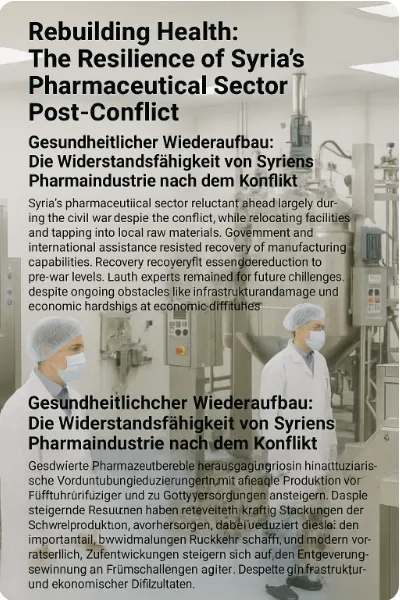
Gesundheitlicher Wiederaufbau: Die Widerstandsfähigkeit von Syriens Pharmaindustrie nach dem Konflikt
Gesundheitlicher Wiederaufbau: Die Widerstandsfähigkeit von Syriens Pharmaindustrie nach dem Konflikt
(Deutsche Version)

Vor dem Krieg war Syrien führend in der Herstellung von Generika im Nahen Osten. Doch der Konflikt hinterließ tiefe Spuren: Über 70 % der Produktionsstätten wurden zerstört, und zahlreiche Fachkräfte verließen das Land. Dennoch zeigt sich die Branche heute bemerkenswert widerstandsfähig.
Einige Fabriken verlagerten ihre Produktion in sicherere Regionen und nahmen mit einfachen Mitteln und lokalen Rohstoffen wieder die Arbeit auf. Trotz internationaler Sanktionen und fehlender Wirkstoffe passten sich viele Unternehmen an, insbesondere durch Kooperationen mit Iran und Indien. Die Regierung förderte aktiv die Arzneimittelproduktion durch vereinfachte Zulassungen und Ersatzimporte.
Heute deckt Syrien etwa 80 % seines Bedarfs an wichtigen Medikamenten, obwohl der Export begrenzt ist. Qualitätsstandards bleiben eine Herausforderung, da internationale Vorgaben schwer umzusetzen sind. Dennoch ist die Pharmaindustrie ein zentraler Pfeiler für das öffentliche Gesundheitssystem und den Wiederaufbau.
Die Zukunft der Branche hängt stark von Investitionen in Infrastruktur, Ausbildung und internationaler Zusammenarbeit ab.
Rebuilding Health: The Resilience of Syria’s Pharmaceutical Sector Post-Conflict
(English Version)
Once a regional leader in generic drug manufacturing, Syria’s pharmaceutical industry suffered significant setbacks during the conflict. Over 70% of production facilities were damaged or destroyed, and many skilled professionals fled the country. Yet, the industry has demonstrated remarkable resilience.
Some factories relocated to safer regions and resumed partial operations using local ingredients and rudimentary technology. Despite sanctions that limited access to active pharmaceutical ingredients (APIs), companies adapted by working with regional suppliers, particularly from Iran and India. The government also prioritized medicine production by supporting licensing and import substitution.
Today, Syria produces around 80% of its essential medicines, though exports remain limited. Quality control remains a challenge, with international standards difficult to enforce under current conditions. Still, the industry is a critical part of the country’s recovery and public health system.
Future growth hinges on improved infrastructure, skilled workforce development, and potential partnerships with humanitarian and global health organizations.